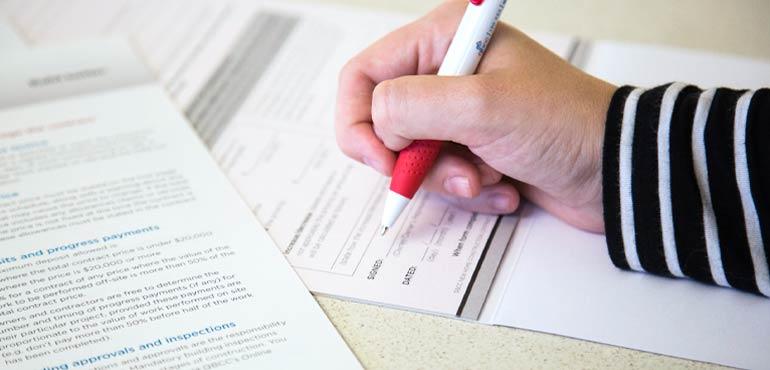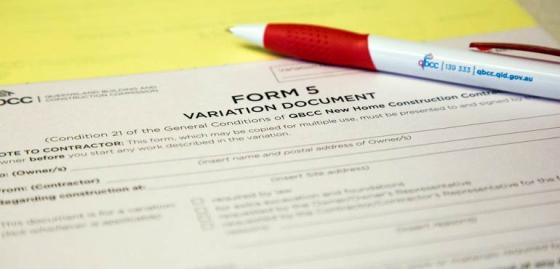
- Home
- Your property
- Build or renovate
- Contracts and payments
Contracts and payments
Whether you're building a house, carrying out a renovation, or you just need a written agreement between you and your subcontractors, you can download a fully compliant contract here for free.
Contracts
If you're carrying out domestic building work over $3,300, you'll need a contract. The QBCC offers contract templates for consumers and contractors to use.
You don't have to use a QBCC contract. If you prefer, you can use one from an industry association, but you do need to make sure that it complies with Queensland legislation. For those wanting to use an interstate contract, unfortunately they don't usually comply with the QBCC legislation.
Alternatively, you can develop your own contract, but if you choose this option, you must get legal advice first.
You should carefully check the contract details and seek legal advice before signing to ensure you are aware of your rights and obligations.
Before you sign a contract
Before you sign a contract, read our guide:
Domestic building contracts—information for owners and contractors (PDF, 918KB)
It contains general information about domestic building contracts and the relevant Queensland legislation.
Consumer building guide - version 3
Your contractor must give you a consumer building guide before you sign a contract for any domestic building work priced at $20,000 or more (i.e. level 2 contracts). This is a consumer information document for homeowners about key building issues, and how best to avoid disputes and common pitfalls.
Warning
As a consequence of the Treasury Laws Amendment (2017 Enterprise Incentives No. 2) Act 2017 (Cth) (the Act) which came into effect on 1 July 2018, QBCC has amended its building contracts to better address a party's right to terminate the contract for reasons related to the insolvency of the other party to the contract.
As the Act applies to all domestic and commercial building contracts entered after 1 July 2018, QBCC wants to ensure any person entering a contract after that date uses an updated version of the contract, to avoid certain existing clauses being deemed to be unenforceable by the Act. If you have a copy of a QBCC or other building contract dated prior to 1 July 2018, you should discard that contract and replace it with a more recent version which reflects the changes introduced by the legislation mentioned above.
Consumers are reminded that the termination of any contract is a significant step which should not be taken without prior legal advice from an experienced lawyer.
Changes and variations
Building or renovating a home is sometimes a work in progress and, as with any significant project, you or your contractor may have to make some changes along the way.
Changes to the contract after it is signed are referred to as variations. Variations should be kept to a minimum to avoid cost overruns and potential confusion on site. It is important to document agreed variations in writing.
Learn more about:
- the correct way to document and implement contract variations
- changing your home warranty insurance when your contract is varied.
Document variations in writing
Record and approve all variations before they are implemented.

Contract issues
If you and your builder are in disagreement over a contractual issue which you are not able to resolve yourselves, you must explore our dispute resolution processes before going to Queensland Civil and Administrative Tribunal (QCAT) or court.
Other options for resolving contract disputes
You may have remedies available under your contract, including:
- liquidated damages—where you receive a prearranged amount of money per day if the contractor fails to complete the project on time, or
- contract termination—where there has been a substantial breach of the contract and you have followed the termination procedures in the contract. It is essential that you obtain legal advice before ending the contract for any reason. If your contract is not properly terminated you may lose some protection under the Queensland Home Warranty Scheme.
We can direct a contractor to rectify defective work even if the contract is terminated, as the contractor is still responsible for the work that has been completed.
Paying for the work
Don't be tempted to pay ahead of time. You may end up paying for work that might not get done and, importantly, you are also likely to reduce your protection under the Queensland Home Warranty Scheme. Sticking to the payment schedule outlined in your contract will help protect you in situations where your builder is unable to finish your job.
The laws surrounding how much you should pay for a deposit and for progress payments are very specific and are outlined below.
Deposits
Generally the maximum deposit a contractor is allowed to request is:
- 5% deposit—for building work that costs $20,000 or more
- 10% deposit—for building work where the contract price is between $3,300 and $19,999
- maximum of 20%—for work priced at $3,300 or less.
Exception
- 20% deposit—where more than 50% of the value of the work is to be performed offsite (e.g. for kitchen renovations where the modules are custom made in a factory).
Progress payments
For all contracts priced at more than $3,300, the number and timing of progress payments is a matter of negotiation between you and the contractor. However, all progress payments must be related to the amount of work performed on site.
For example, the contractor can't claim more than 50% of the contract price, including the deposit, until at least 50% of the work has been completed on site.
Payment tips to ensure you are covered
The law limits payouts under the Queensland Home Warranty Scheme. To make sure you will be fully covered by the scheme if things go wrong, make sure you:
- don't pay more than the maximum deposit allowed by law
- don't pay in advance (i.e. you stick to your payment schedule)
- get realistic quotes
- agree to a fixed-price contract, not a cost-plus contract.

Bankruptcy and incomplete work
Where your builder has defaulted before all work is completed, you may be able to get help to complete your project under the Queensland Home Warranty Scheme.
To be entitled to assistance under the scheme, the contract must be terminated due to the builder's default. Common grounds include:
- a builder working under his own name as a sole trader, going bankrupt
- a builder operating as a company being placed into liquidation
- suspension or cancellation of the builder's licence.
You should seek legal advice to confirm whether you can and should terminate your contract.
Find out how to lodge a non-completion complaint.

